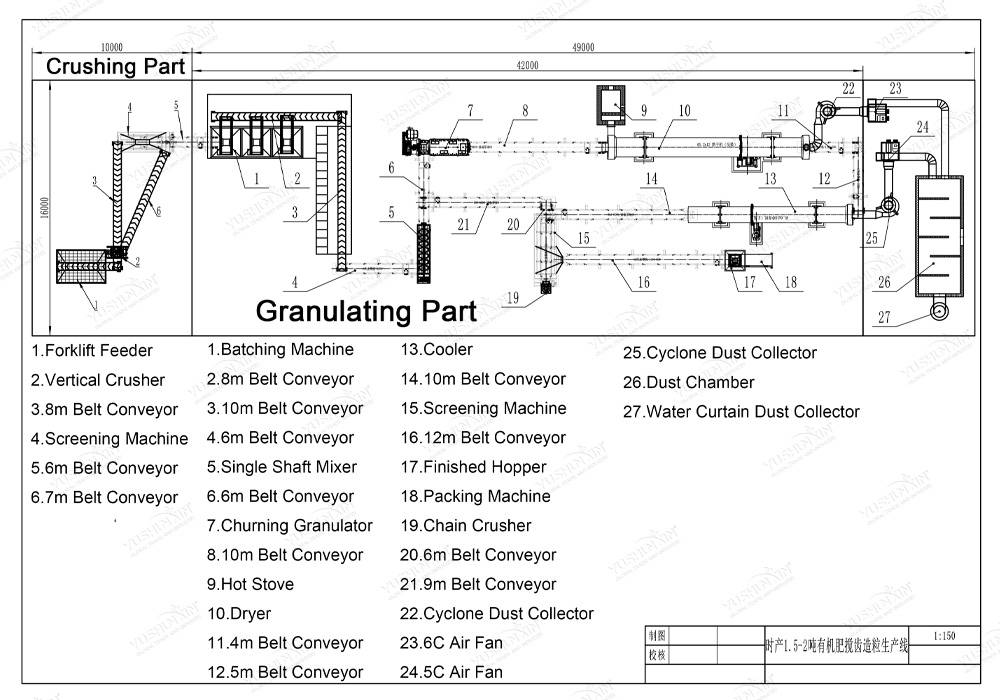

Sistemes d’emmagatzematge i alimentació de matèries primeres:
Equipament de barreja:
Equips de granulació (Si es requereix):
Equip d'assecat:
Equip de refrigeració:
Equips de detecció i cribratge:
Equip de revestiment (Opcional):
Equip d'embalatge:

Nutrients primaris:
Nutrients secundaris:
Micronutrients (Rastreig elements):
Agents quelants (per a micronutrients):
Acidulants o ajustadors de pH:
Additius:
Materials portadors (opcional):
El cost de cada línia de producció varia segons la capacitat de producció, grau d'automatització, i necessitats específiques. Empleneu el formulari següent i us proporcionarem un pressupost precís!
Si us interessa el nostre equipament de fertilitzants, Envieu els vostres requisits i contactes i, després, ens posarem en contacte amb vosaltres en dos dies. Prometem que tota la vostra informació no es filtrarà a ningú.
- La companyia va ser fundada a 2005 i s'ha centrat en la investigació i el desenvolupament i la fabricació d'equips de fertilitzants orgànics per a 20 anys. Ha construït una base de producció d’equips orgànics de 40.000 m a gran escala, Utilitzant granulació avançada, Tecnologies d’assecat i cribratge per millorar l’eficiència de la producció i la qualitat del producte.
- Una empresa autosuficient i exportada amb més de 80 Enginyers professionals a tot el món, Servint més de 100 països i regions de tot el món, 5,000+ Casos d’atenció al client, 10 centres de processament, 3 màquines de tall làser, I més que 60 Equip de diversos tipus.
- Mantenir una cooperació a llarg termini i extensa amb molts instituts i universitats de recerca científica, with a professional R&D team, pot optimitzar contínuament el rendiment dels equips segons la demanda del mercat.
- Materials resistents al desgast d’alta resistència, Es selecciona l’acer de carboni Q235/aliatge per assegurar -se que l’equip és durador i reduir els costos de manteniment.
- Adopció de sistemes de control intel·ligents per millorar el nivell d’automatització de producció i reduir la dependència manual.
- ISO, Fun, Certificació Internacional de SGS
- Amb capacitat de producció a gran escala, pot complir els requisits de capacitat de producció diferents (petit, línies de producció mitjanes i grans).
- Una gamma completa de models d’equips, Apte per a la producció de diversos tipus de fertilitzants com ara fertilitzants orgànics, fertilitzant compost, fertilitzant biològic, fertilitzant soluble en aigua, fertilitzant líquid, etc..
- El disseny personalitzat es pot proporcionar segons les necessitats del client, inclosa la capacitat de producció, disposició del lloc, Normes de protecció ambiental, etc..
- Proporcioneu un conjunt complet de solucions de línia de producció, inclosa la selecció d'equips, instal·lació i posada en servei, Formació tècnica, etc..

- Subministrament de fàbrica directa, Reduir l’enllaç intermediari, I el preu és més competitiu.
- L’equip té una alta eficiència energètica, Redueix el consum d’energia, i ajuda els clients a reduir els costos operatius a llarg termini.
- Subministrament de fàbrica directa, Reduir l’enllaç intermediari, I el preu és més competitiu.
- L’equip té una alta eficiència energètica, Redueix el consum d’energia, i ajuda els clients a reduir els costos operatius a llarg termini.
Singular Agronomics augmenta la producció de fertilitzants amb el nostre granulador de doble corró
Solució eficient de tornejat de compost lliurada a un client filipí
Lliurament amb èxit d'un granulador de discos a un client xilè per a la producció de fertilitzants
 ×
×
 Català
Català